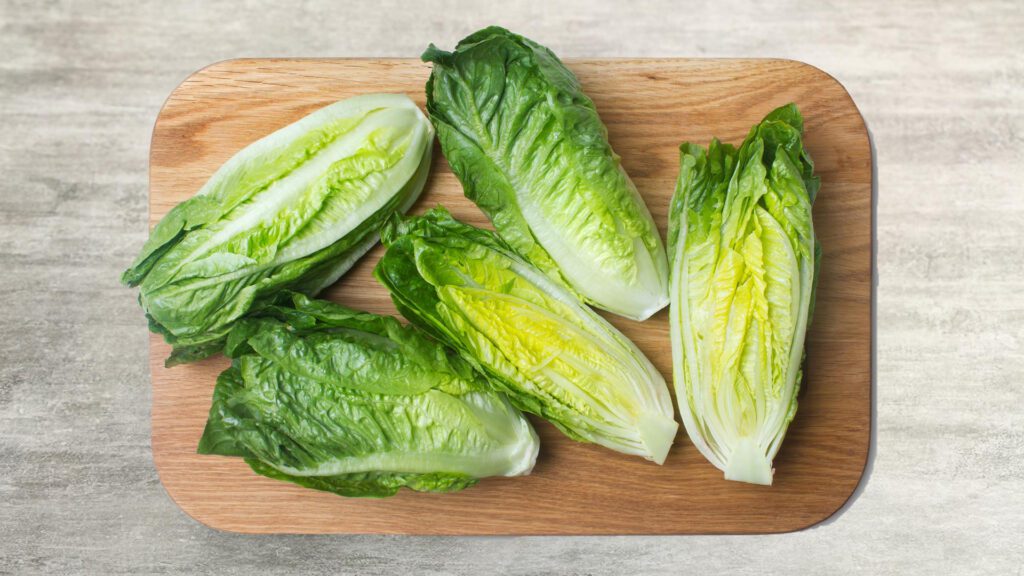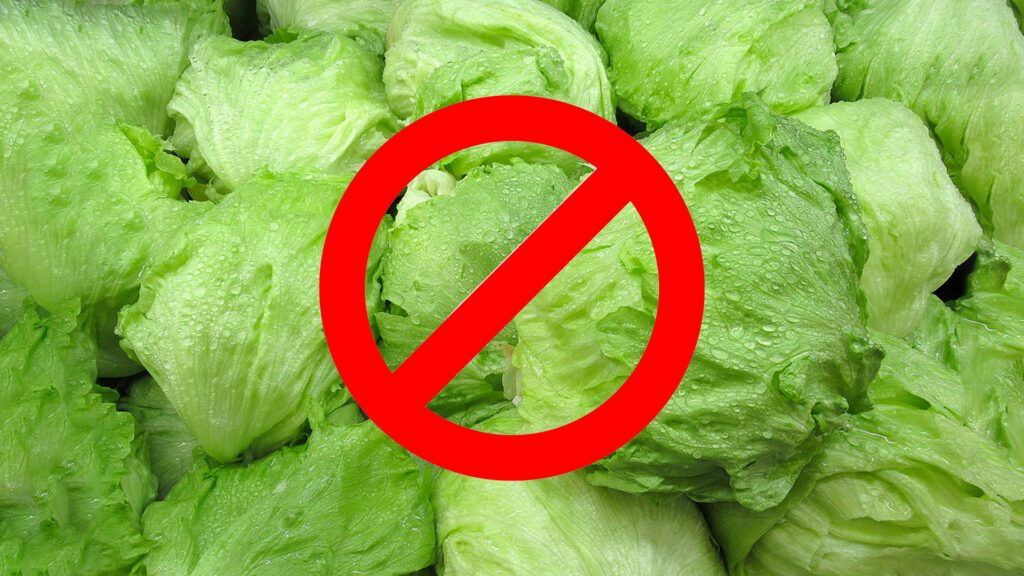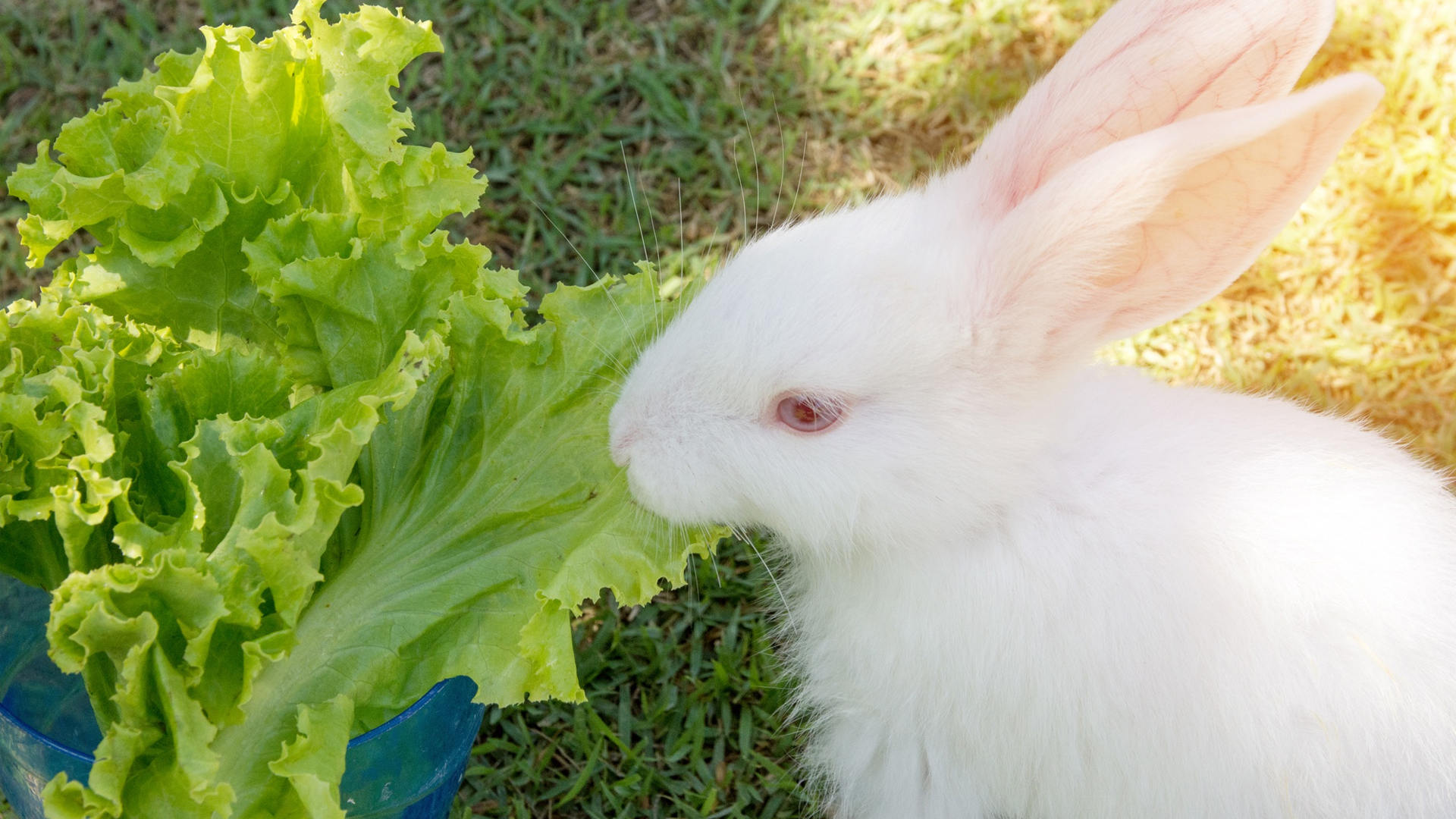We often assume that anything that looks green is automatically healthy. This can apply to humans, but what about rabbits and their unique digestive tract?
How safe is a leafy green like lettuce for rabbits? I also had the same confusion and hence I did my research so now you don’t have to!
Can Rabbits Have Lettuce?
Yes, rabbits eat lettuce, but too much can cause stomach issues for your bunny, so give it to them in moderation as a treat.
Rabbits eat various foods, such as dark leafy greens and vegetables. Certain types of lettuce, like romaine or arugula, can diversify their mealtime options as they are packed with nutrients and fiber.
Different Lettuces for Your Rabbit
As mentioned above, not all lettuces are the same, especially for your bunny’s health. Here are some further details on the different types of lettuce.
Romaine Lettuce

Eating romaine lettuce is highly recommended for rabbits, as it is both crunchy and nutritious.
It’s high in soluble fiber, which is excellent for your rabbit’s digestive system. Give it in moderation to prevent any digestive upset.
Butterhead Lettuce
It’s a tasty treat that should be given in small amounts to monitor food intake and avoid overfeeding. Its high water content can be refreshing, but it’s not a substitute for a balanced diet.
Green Leaf Lettuce
It’s a bit lighter in nutrients than romaine, but it’s still a healthy option for adding variety to your pet’s diet.
Red Leaf Lettuce
This lettuce adds a pop of color and is nutritious, but just like its green counterpart, it should be given sparingly. Too much can cause health issues, so stick to small amounts and provide a gradual introduction to new varieties.
Bibb Lettuce
A relative of butterhead, this lettuce is safe for more frequent munching. It’s softer and sweeter, making it a favorite among rabbits, especially in different varieties of lettuces available.
Iceberg Lettuce
Some lettuce options include those that are better avoided, especially iceberg lettuce, which should be fed sparingly.
This lettuce contains a chemical that is not safe for rabbits to eat, and it’s low in fiber and nutrients, which are essential for your bunny’s health and can pose digestive problems.
Oak Leaf Lettuce
It’s fine for a nibble occasionally but not a diet staple. Its unique shape and texture can be a fun treat, but it shouldn’t replace more nutritious options that provide a balanced diet for your rabbit.
Feeding Lettuce To Rabbit: How Much Lettuce Is Safe?
While rabbits can munch on lettuce, keeping it as a small part of their overall diet is best.
Ideally, fresh vegetables like lettuce should make up only about 10% of their diet. This ensures they get a balanced diet with all the nutrients they need.
A good rule of thumb is to offer around 2 cups of mixed vegetables for every 6 pounds of your rabbit’s weight. This mix can include a variety of leafy greens, with lettuce being just one of the options.
Introducing This Leafy Green
Before you give lettuce to your rabbit, there are a couple of things you should do.
First, wash the lettuce thoroughly to remove any pesticides or chemicals that might be on the leaves. These substances can be harmful to your rabbit’s health.
After washing, shred the lettuce into smaller pieces. This makes it easier for your rabbit to eat and digest fresh greens.
Also, slowly introducing new foods into their diet can help prevent any stomach upset.
Types Of Lettuce To Avoid Feeding Your Rabbit

Knowing which types of lettuce are safe and which ones to avoid is important for keeping your bunny healthy and happy.
Red Lettuce
Oak Leaf Lettuce
Iceberg Lettuce
Butterhead Lettuce
The Ideal Diet For Rabbits
Despite all the nutritional benefits, lettuce is just a treat for rabbits and not their main meal. A rabbit’s diet should be mostly hay, about 80%, with a side of fresh veggies (15%) and a sprinkle of pellets (5%). The table below will help you understand better.
| Rabbit Weight (lbs) | Hay | Pellets (cups) | Greens (cups) | Vegetables (tablespoons) |
|---|---|---|---|---|
| 2 | Unlimited | 1/8 | 1 | 1 |
| 4 | Unlimited | 1/8 | 2 | 2 |
| 6 | Unlimited | 1/4 | 3 | 3 |
| 8 | Unlimited | 1/2 | 4 | 4 |
| 10 | Unlimited | 1/2 | 5 | 5 |
| 12 | Unlimited | 3/4 | 6 | 6 |
| 14 | Unlimited | 3/4 | 7 | 7 |
Frequently Asked Questions
Here are some frequently asked questions regarding this topic, which also provide insights into the daily diet of rabbits.
Q: What Are Some Other Safe Greens And Vegetables For Rabbits?
A: In addition to romaine lettuce, you can also feed your rabbit other safe greens. You can consider feeding your rabbit vegetables like bell peppers, parsley, cucumbers, broccoli, celery, and cabbage.
It’s recommended to offer 3 to 5 different types of greens per day to ensure a balanced diet for the rabbit’s overall health.
Q: Are There Any Vegetables I Should Avoid Feeding My Rabbit?
A: Yes, some vegetables should be avoided, such as onions and potatoes. Always opt for high-quality varieties like bell peppers and cucumbers, which are safe for rabbits, to ensure a balanced daily food intake and healthy fur.
Q: What Is The Nutritional Value Of Romaine Lettuce For Rabbits?
A: Romaine lettuce has some vitamins and minerals, but it also has high water content and low nutritional value. It should be considered a treat rather than a staple in your rabbit’s diet.
Q: Can My Rabbits Eat Cooked Vegetables?
A: No, rabbits should only eat fresh vegetables and greens in moderation to maintain a healthy body weight.
Cooked vegetables can alter their dietary balance. This may lead to digestive issues and gastrointestinal discomfort if consumed in large quantities.
Q: What Should I Do If My Rabbit Shows Signs Of Digestive Upset After Eating Lettuce?
A: If your rabbit shows signs of digestive upset, such as changes in stool or lethargy, immediately remove the lettuce from their diet and consult your veterinarian for advice.
Conclusion
In conclusion, incorporating fresh greens like lettuce can be beneficial when introduced into a rabbit’s daily diet gradually.
Greens and veggies are loaded with incredible nutrients, such as vitamins, minerals, and antioxidants. They also contain water and help provide hydration to your rabbits. So, make sure to utilize them wisely!


